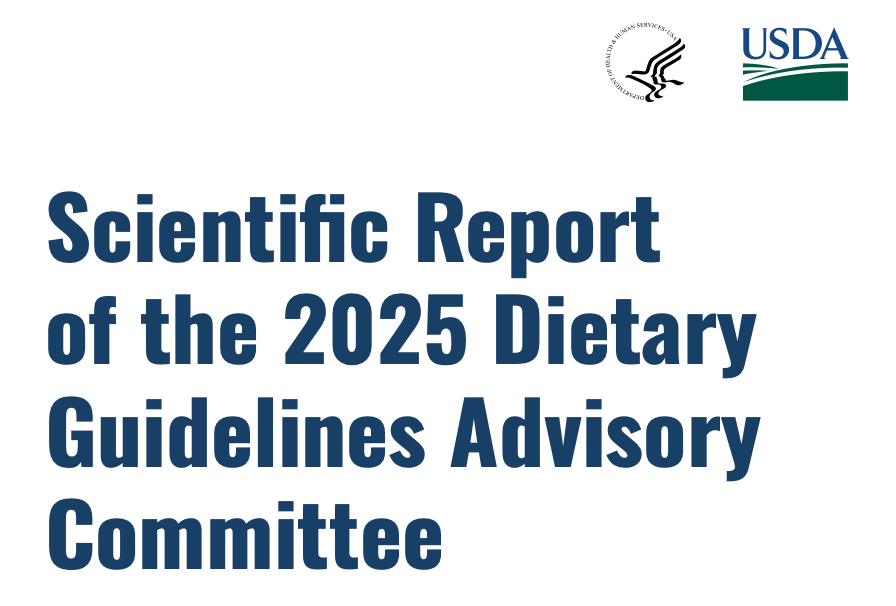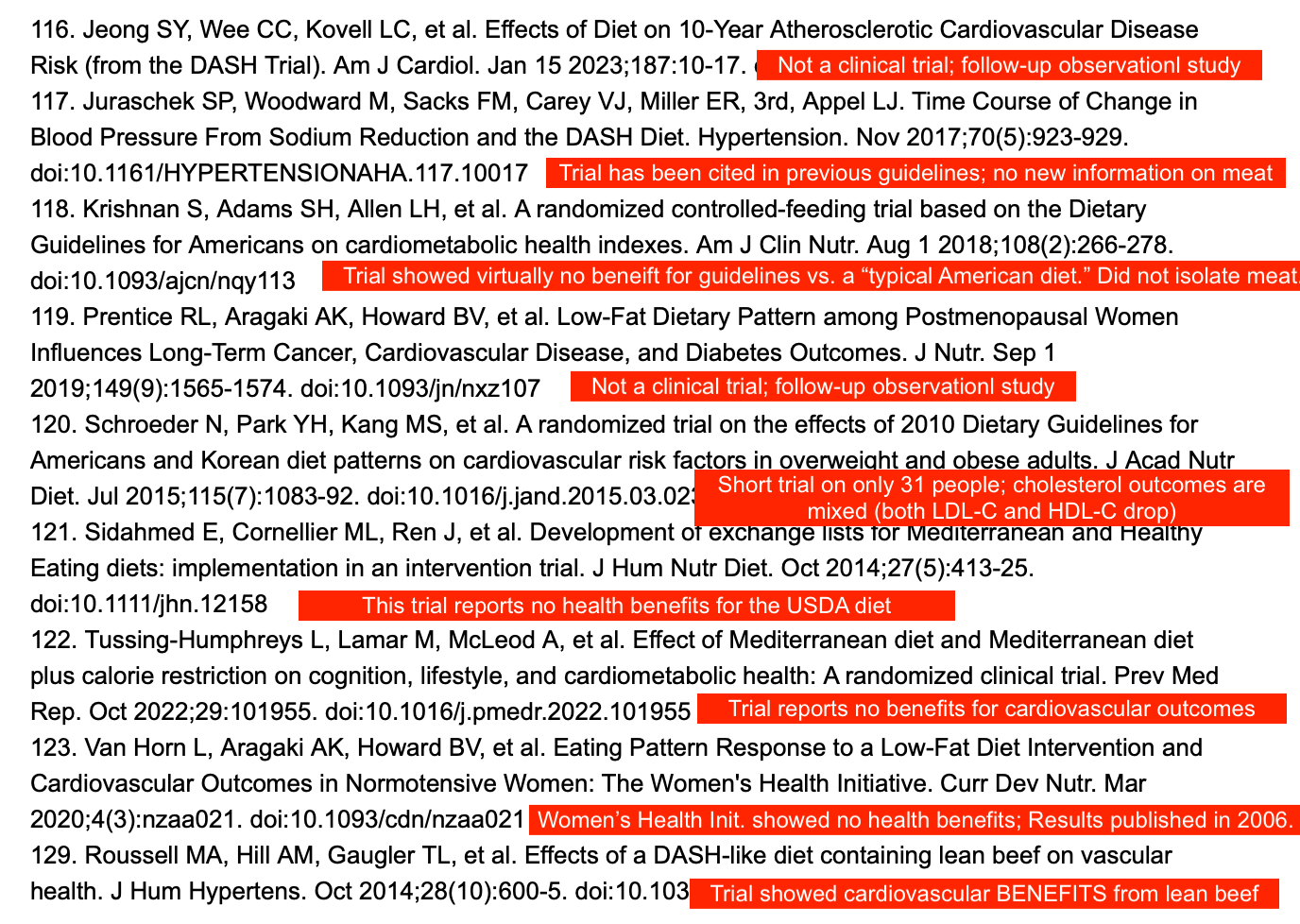Nina’s new piece on the Dietary Guidelines scientific report. I particularly liked the key recommendations that this report makes: I would struggle to find worse things that you could do for your health than what they are recommending in this report. I am doing the exact opposite.
Majority of clinical trials in expert reviews do not show health benefits
NINA TEICHOLZ
DEC 11 



 READ IN APP
READ IN APP
The highly-anticipated scientific report for the 2025 U.S. Dietary Guidelines was finally released yesterday by the U.S. Departments of Agriculture and Health and Human Services (USDA-HHS). The 421-page tome is meant to inform new guidelines due next year, although the task of writing the guidelines policy itself will fall to USDA-HHS political appointees.

Typically, the scientific report is released in early fall, allowing the mandatory 60-day public comment period to conclude before the outgoing administration finalizes the guidelines. However, in this case, the comment period will extend beyond the Biden administration into the Trump era, shifting responsibility for drafting the guidelines to the newly appointed Secretaries of the USDA and HHS.
While the Secretaries are legally required to issue dietary guidelines, the law sets few constraints on how they proceed. There’s no statutory requirement to promote the guidelines to the public, for instance, and the Secretaries can accept or reject recommendations from the scientific report as they please.
No doubt, any decisions they make will be seen as fueled by political considerations, yet there’s a far better reason to reject a number of the new recommendations: they are not based on rigorous science and, in many cases, would almost certainly harm our health.
Key recommendations in this report include:
- Reducing red and processed meats;
- Replacing poultry, meat, and eggs with peas, beans, and lentils as sources of protein;
- No limits on ultra-processed foods; and
- Continued caps on saturated fats, to be replaced by vegetable (seed) oils.
Controversy over ultra-processed foods
The question of whether the expert committee should set limits on ultra-processed foods (UPF) has sparked controversy ever since the group’s final public meeting, when it revealed it couldn’t make a recommendation to restrict these foods, because the evidence on them was “limited.” Calls for reducing UPF have transcended partisan lines—from Robert F. Kennedy Jr. reportedly advocating for their removal from school lunches to Marion Nestle, NYU professor emerita, calling the committee’s “non-recommendation” a “travesty.”
Indeed, there is, “remarkable, strong bipartisan concern about ultra-processed food,” as Jerold Mande, a former deputy undersecretary for food safety at the Department of Agriculture under two Democratic presidents, told Time magazine.
Nevertheless, the expert committee responsible for yesterday’s report insisted that the evidence for urging reductions in ultra-processed foods (UPF) was “limited.”
It’s possible that conflicts of interest on the expert committee may have influenced this decision. Nine out of the 20 members were found to have a tie with food, pharmaceutical or weight loss companies or industry groups with a stake in the outcome of the guidelines, according to a report by the non-profit public interest group, U.S. Right to Know. The most frequently occurring conflicts were with Novo Nordisk and Eli Lilly, makers of weight-loss shots like Ozempic and Wegovy.
Still, it’s important to say that the committee’s assessment of the evidence on UPF as limited is correct. The USDA systematic review of these foodsfound only one small clinical trial testing the effects of these foods on health outcomes. This trial, conducted at the National Institutes of Health, involved 20 adults for only 28 days (14 days on a UPF diet and 14 days on a whole-food diet). The subjects were found to consume more calories while on the UPF diet, but even so, the test is too small and preliminary to generalize its conclusions to an entire nation. As I’ve written before, we have many more and better studies on some of the components of ultra-processed foods—sugars and starches, for instance—and should act on these, more precise and robust data first.
Marion Nestle acknowledged on her blog that the advisory committee must stick to “ evidence-based recommendations,” while giving the strong impression that she wished it weren’t so. She’s also quoted in a STAT articlethat headlines her comment about the “impossible restrictions” imposed on the guidelines by limiting recommendations to only those supported by strong evidence.
In my view, we should not be arguing for guidelines based on lesser evidence. The near-complete lack of rigorous data for the original guidelines in 1980 set in motion a Titanic of misguided advice that has coincided with our astonishing epidemics in chronic diseases. According to the best available government data, Americans have largely followed the guidelines, and despite this, we have not only become sick but very sick.
Echoing this view is a Congressionally mandated report by the National Academies of Sciences, Engineering, and Medicine, which concluded in 2017 that the US dietary guidelines are not currently “trustworthy,” in part due to a “lack of scientific rigor” in the process. Since then, little has changed (the USDA did not fully adopt even one of the Academies’ 11 recommendations). In this light, advocating for even less rigorous standards based on even weaker evidence seems to me misguided or possibly reckless.
Lower standards for reducing meat, poultry and eggs
Paradoxically, the expert committee was not a stickler for rigorous evidence when it came to advising reductions in meat, poultry, and eggs.
Before getting into the evidence, though, I’d like to revisit the likelihood (as I wrote in an earlier post) that these changes, if adopted, would exacerbate our disease epidemics. This advice does not consider that plant-based proteins are not as complete as those from animals and also not as bioavailable. Plant sources like peas and beans also pack a hefty load of carbohydrates and calories for the same amount of protein, making them a far less healthy option for people with metabolic conditions such as obesity and diabetes who need to be mindful of controlling their blood sugars.
The expert committee also found that reductions in meat, eggs, and poultry would lead to further shortfalls in fiber, and vitamins D and E, a significant fact given that the existing guidelines already fail to meet goals for vitamins D and E, folate, choline, and iron.
Here are the committee’s findings on nutrients announced at its final public meeting:

A lack of essential nutrients leads to a myriad of diseases and health conditions. One has to wonder why the long-standing nutritional deficiencies in the guidelines haven’t been corrected—and are getting worse.
Studies cited do not support expert report claims
Most importantly, the evidence used to support new and existing guidelines’ recommendations is insufficient and contradictory.
Three major systematic reviews–on obesity, type 2 diabetes, and heart disease– claim the data are “strong” to support claims that the US Dietary Guidelines prevent these conditions in adults. These reviews are also cited to support the new recommendation for reducing red/processed meats. Yet the clinical trials listed fail to support these claims.
Here are the trials listed for heart disease. As you can see, one trial shows cardiovascular benefit from red meat. Four trials show little-to-no benefit, and three are not trials but observational follow-up studies of trials published long ago. Another study was from 2017 and would had been covered in previous guidelines’ reviews. It’s fair to say that the totality of these results do not support the claim that the ability of the guidelines to prevent heart disease is “strong.”

The reviews on obesity and type 2 diabetes are much the same.
For obesity, 24 trials are listed. Among these:
- Nine are reported to have “not statistically significant”¹ results on health outcomes for obesity;
- One (Crosby 2022) was conducted by the animal rights group, the Physicians Committee for Responsible Medicine and is therefore likely to be biased;
- Three (Alvarez-Perez, 2016, Casas, 2022, Van Horn, 2020) are incorrectly listed as clinical trials; these are follow-up observational studies to clinical trials published more than a decade ago;
- Seven appear to show weight-loss benefits for a diet more-or-less like the Dietary Guidelines. Quite a few of these are hard to interpret, since the intervention diet reduced both red meat and sweets, so it’s not clear which of these dietary elements, or indeed the many others, might be responsible for the weight loss observed.
Other trials did not appear to test a diet similar to the Dietary Guidelines.
For type 2 diabetes , 13 trials are listed as evidence that the guidelines can prevent this condition. Of these:
- Ten are reported to have “not statistically significant” results on health outcomes for diabetes;
- Two (Howard, 2018 and Prentice, 2019) are incorrectly listed as clinical trials; these are follow-up observational studies on the Women’s Health Initiative, which had its results published in 2006.
- A single trial (Pavic, 2019) appears to have shown some health benefits, but the outcomes aren’t clear (to me).
There are bound to be some mistakes in my lists above; this summary is just a first take.
Here’s the point: every step in the process that produces reviews like these is broken. The USDA office that conducts the reviews lacks rigor (as the National Academies found); the expert advisory committee doesn’t appear to have checked the evidence; and the “peer review” process for the systematic reviews was completed by federal employees with a conflict of interest (e.g., reviewers who criticize the USDA report rightly fear losing their jobs).
If you have been following my work, you know there’s a history here. When I fact-checked every single study cited in the 2015 Dietary Guidelines for a BMJ cover story, it triggered one of the largest retraction efforts in recent history—though it was ultimately unsuccessful. A key finding of my investigation was that the USDA-HHS dietary patterns were supported by “a minuscule quantity of rigorous evidence that only marginally supports claims that these diets can promote better health than alternatives.”
This paper has been largely ignored. Seven years later, in 2022, I teamed with top nutritionists , including former members of previous Dietary Guidelines Advisory Committees, to write a critical review of the guidelines that was published in a journal of the National Academies of Sciences. USDA-HHS officials responded with an article entitled, “Addressing misinformation about the Dietary Guidelines for Americans.”
I’m not a fan of the term “misinformation,” but with respect to non-evidence based dietary advice, the USDA-HHS are prominent actors. The National Academies and many peer-reviewed publications have now established the faulty evidence underpinning the US dietary guidelines, in addition to the lack of transparency and many conflicts of interest in the guidelines process.
We do not need more evidence. We require only the political will to create change so that we might have a national dietary policy that we can trust—and the good health that we deserve.
My thanks to Jenni Callihan for her research contribution.
Upgrade to paid
1
In these reviews, “NS” is reported to mean “not statistically significant;” The word “null” means that the results do not support the hypothesis (in this case, that a Dietary Guidelines-type diet can prevent chronic diseases.




 🫣. By chance, did you mean a “big fat steak”??
🫣. By chance, did you mean a “big fat steak”??

 Still super tasty and somewhat satiating (very satiating per weight but it brings so much carbs and some fat too that overeating is still easy for me. I need high protein food and that’s about it)…
Still super tasty and somewhat satiating (very satiating per weight but it brings so much carbs and some fat too that overeating is still easy for me. I need high protein food and that’s about it)…





 . They have an agenda: they want us all eating plants only, which will be terrible for our health, terrible for animals overall, and terrible for the environment. They are so wrong it is embarrassing.
. They have an agenda: they want us all eating plants only, which will be terrible for our health, terrible for animals overall, and terrible for the environment. They are so wrong it is embarrassing. I love pigs, I can’t help they are tasty, not just adorable, playful and smart… Sigh. But give me cheap crickets, affordable seafood without overfishing and maybe I can eat less of them…? No, legumes can’t help but they are tastiest with some smoked pork hocks if you ask me, the more the better… And we have a dish called Bean Goulash, I think I never had it but sounds tasty… And too carby as well. The normal one is already carby…)
I love pigs, I can’t help they are tasty, not just adorable, playful and smart… Sigh. But give me cheap crickets, affordable seafood without overfishing and maybe I can eat less of them…? No, legumes can’t help but they are tastiest with some smoked pork hocks if you ask me, the more the better… And we have a dish called Bean Goulash, I think I never had it but sounds tasty… And too carby as well. The normal one is already carby…)